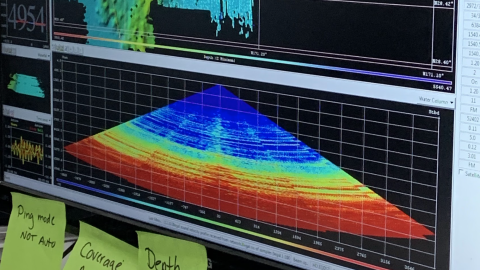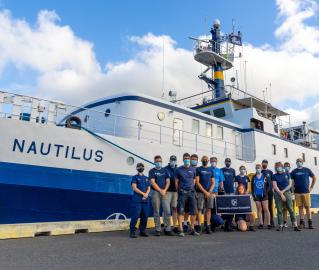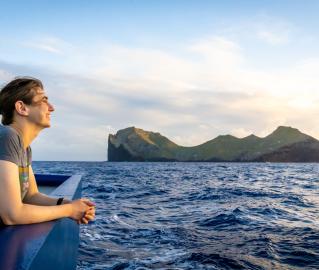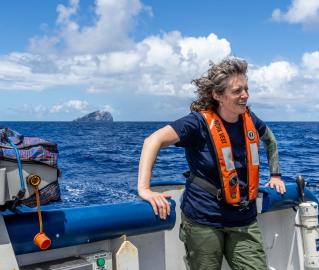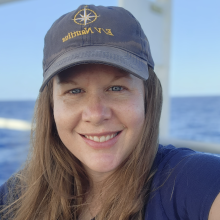
Anne Hartwell
Tell us about your work/research. What kinds of things do you do?
My research focuses on exploring and characterizing deep-sea habitats. I am working to identify relationships between environmental variables, such as the shape of the seafloor and water temperatures, and the organisms that live in deep-sea. The information I learn about those relationships will go into tools used to predict the presence of organisms in areas of the seafloor for which only environmental data are available as well as understand the implications of environmental changes. My work incorporates pictures and measurements collected with underwater robots, as well as information we can extract from maps of the seafloor. The kinds of maps I use in my research as the same types of maps we produce with the multibeam systems on the Nautilus!
What sparked your initial interest in your career?
Honestly, it probably started with the opening scenes of the Titanic combined with the fact that our family's van was a great place to play submarine. I recognized it as a viable career pathway in an Oceanography class I took during the 2nd semester of freshman year. I was captivated by the way the late Dr. Karen Von Damm shared her experiences with deep-sea exploration so enthusiastically and conveyed the importance of learning about the unknown. I was fortunate to find my way back to deep-sea research when I dove in a submersible in 2014 and became completely aww-inspired by the vibrant animals that live in the deep sea.
Who influenced you or encouraged you the most?
Dr. Karen Von Damm was a major influence on my entrance into the field through her enthusiasm and love for the research.
What element of your work/study do you think is the most fascinating?
The most fascinating part of my work is the number of colors I see in the videos that the underwater robots collect. We'll be 2 miles below the surface, in a normally dark place, you'll basically see a rainbow of colors. I really love that.
What other jobs led you to your current career?
I have help a few positions as a Research associate/technician. As a research associate in a geochemistry lab and had ample opportunities with analyzing samples, working with students, working and prepping for the field, and preparing reports. I really loved the aspect of focusing on making sure the science got done. It is an element of contracting that I really enjoy. I've also had the opportunity to teach and regularly participate in outreach with K-12 learners. As my career develops It is important to me that I maintain an element of communication because I believe it is a responsibility as a scientist to share what we are learning in a way that the listener can understand.
What are your degrees and certifications?
Current: PhD Candidate in Oceanography- University of New Hampshire
Masters of Science in Oceanography- University of Rhode Island (2013)
Bachelor of Science in Geology- University of New Hampshire (2010);
What are your hobbies?
I enjoy playing my flute, snowboarding, sailing, eating, and singing off the cuff parodies about my cat, to my cat.
How did you get involved with the Nautilus Exploration Program?
My first expedition with OET was a member of the science team in 2018 to deploy some instrumentation for another scientist. I began sailing as a Mapper in 2019 after I began as a graduate student in the Center for Coastal and Ocean Mapping at UNH.
What advice would you give someone who wants to have a career like yours?
Do not be afraid to voice your desire to help, take lead, and ask questions. Be persistent in seeking opportunities and remember that the path to deep sea exploration and research is different for everyone!
Expeditions
Anne participated in the following Ocean Exploration Trust expeditions:
